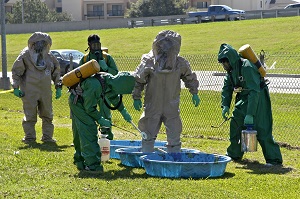By Katie Regan, Communications Specialist, NACCHO
 Whether terrorist or criminal in nature, intentional or accidental, a chemical incident is a possibility all local public health departments face. Therefore, public health should ensure response procedures and preparedness efforts are in place before an event happens to make sure their community is resilient. As first responders, it is especially important for local health departments to familiarize themselves with all of the entities who respond to and mitigate potential chemical incidents. Health officials should partner with other local, state, and federal agencies in their communities to prepare for a coordinated response to such an incident. To help train and prepare for a response, public health should work with the Federal Bureau of Investigation (FBI) Weapons of Mass Destruction (WMD) Coordinator in their area.
Whether terrorist or criminal in nature, intentional or accidental, a chemical incident is a possibility all local public health departments face. Therefore, public health should ensure response procedures and preparedness efforts are in place before an event happens to make sure their community is resilient. As first responders, it is especially important for local health departments to familiarize themselves with all of the entities who respond to and mitigate potential chemical incidents. Health officials should partner with other local, state, and federal agencies in their communities to prepare for a coordinated response to such an incident. To help train and prepare for a response, public health should work with the Federal Bureau of Investigation (FBI) Weapons of Mass Destruction (WMD) Coordinator in their area.
The FBI is the lead federal agency responsible for investigating WMD-related crimes. In 2006, the FBI consolidated its WMD investigation and prevention efforts into a single directorate within the FBI’s National Security Branch, known as the Weapons of Mass Destruction Directorate (WMDD). The WMDD is responsible for the detection, deterrence, and disruption of the use of WMDs; one of the most important ways WMDD accomplishes its mission is by placing WMD Coordinators at each FBI field office across the country. The WMD Coordinator is an FBI special agent responsible for carrying out WMD-related activities for their field office, to include conducting training, outreach efforts, and investigations or responses to WMD incidents alongside state, local, and federal partners.
To assist WMD Coordinators with multiagency trainings in their territory, the WMDD designs WMD exercises that bring together local, state, and federal partners across several industries. One example is the WMDD Livewire program, a tabletop exercise that tests responses to a fictional chemical incident and exploits potential vulnerabilities or threats which if mitigated, strengthens the first response community. Since September 2013, the FBI has conducted 13 Livewire exercises, many of which have included public health as a vested stakeholder.
While testing responses to chemical WMD incidents is a key component of the Livewire exercise program, the exercises are also a way to bring different partner agencies together in one room, requiring collaboration to mitigate the WMD incident presented, and encouraging long-term partnerships to prevent future incidents. Participating agencies represent a wide scope of the response community and include representatives from public health, private sector, law enforcement, first responders, state and local government, emergency management, and private industry. In the past, federal-level partners have included the Department of Homeland Security, the Drug Enforcement Agency, the National Guard Civil Support Team, and the Coast Guard, to name just a few.
Such exercises can be particularly useful for local health departments as a recent NACCHO study shows that the role of local health departments in a chemical response is not well-defined. According to the study, though health departments are responsible for protecting human health in hazardous situations, the perception of that responsibility is often limited to disease prevention and control. Chemical incidents are often viewed as hazardous material events rather than public health events, which can result in local health departments being left out of the response. One result of Livewire exercises is that all stakeholder roles, procedures, and capabilities are defined and practiced in advance of any potential WMD incident. Through these exercises, participating agencies are able to discuss and modify their responses in a no-fault environment now, ensuring a more seamless response to a real-world chemical event later.
Additionally, these exercises help the FBI learn about institutional culture across different entities, which leads to better trainings, more successful responses, improved communications, and greater trust among partners. The relationship between the Los Angeles County Health Department and the local FBI field office is an excellent example of successful communication, according to David Centofante, Management and Program Analyst for the FBI WMDD’s Chemical Countermeasures Unit and program manager for the WMDD Livewire program. The two organizations have worked together in the past, most recently during a Livewire exercise held at the University of California Los Angeles, and are very supportive of each other’s work and initiatives.
The FBI greatly values a relationship between public health and the WMD Coordinator and as Centofante states, “They’re each other’s advocates. The FBI and public health have a shared interest in the safety of the community and can rely on one another to contain the health consequences of a chemical incident and investigate its source. The success of prevention and response efforts is dependent upon a good working relationship between health officials and FBI WMD Coordinators.”
The FBI is only able to conduct a handful of these tabletop exercises per year due to capacity issues, but any local health department interested in participating in the training should contact their local WMD Coordinator through their local field office. WMD Coordinators also serve as a reporting mechanism for suspicious activity in the field of public health. Additional trainings and opportunities for collaboration are available through FBI field offices as well.
For more information:
- Local Public Health’s Role in Large-Scale Chemical Incidents (Domestic Preparedness)
- NACCHO Study Examines Local Role in Large-Scale Chemical Incident Response (Preparedness Brief)
- Environmental Health (NACCHO)
- WMD Training – FBI Worst Case Exercise Tests Response to Chemical Attack
- FBI Video – Suspicious Sales: Retail Security Awareness
- FBI Video – Chemical Indicators: Laboratory Security Awareness








